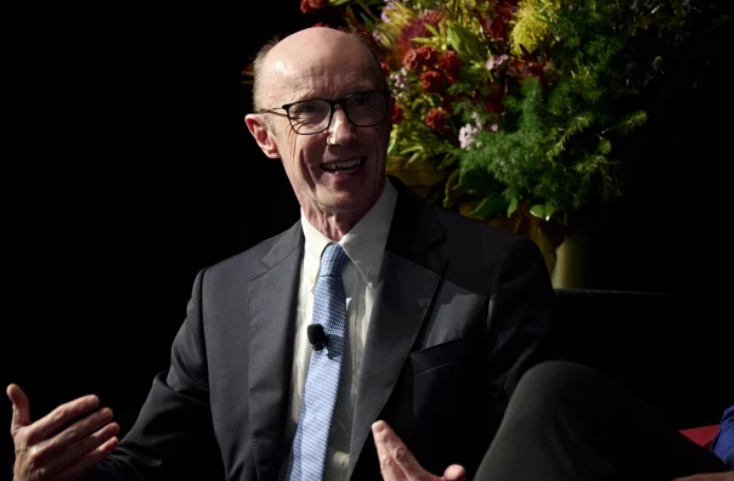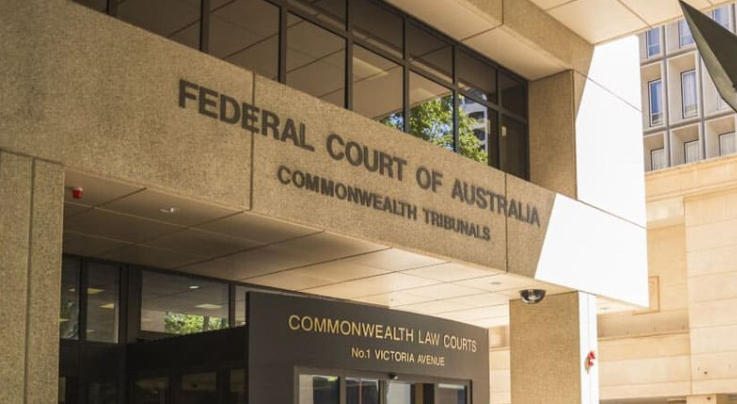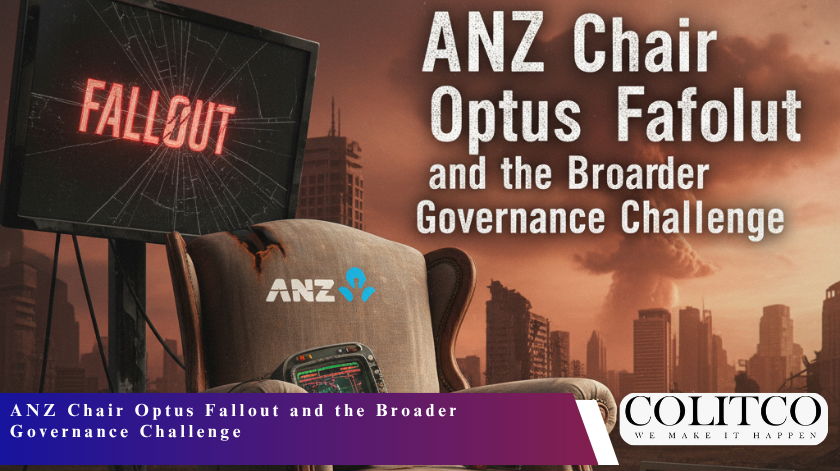The ANZ leadership scandal has taken a different twist since the ANZ Chair Optus fallout incident attracted national interest in corporate responsibility. Although the Optus crisis caused shockwaves throughout the boardrooms of Australia, the Chair of ANZ, Paul O Sullivan, seems to have just escaped the wrath of being directly linked to the issue of poor governance of the telecommunications company. However, the center of attention has now changed to ANZ itself, where more entrenched and challenging problems are emerging.

Being the chair of ANZ and the parent company of Optus, Singtel Optus, O’Sullivan found himself under scrutiny as a result of the data leak and outage of the Optus services. His management experience in two leading corporations has cast doubts on whether there is too much responsibility concentrated on a single person and whether corporate supervision can be effective or not. Although he did not explicitly lay the blame on the Optus crisis, the rising concern about the internal affairs of ANZ has escalated, making the ANZ leadership debacle a focal point in the banking industry.
The Struggle of the Soul Dwarfs the Sympathy of the World
Even though the ANZ Chair has come out as the biggest winner of the telecommunications crisis, now he is concerned with more urgent matters within ANZ. The Australian Securities and Investments Commission (ASIC) has recently disclosed extensive malpractice in various units of the bank, such as the vulnerability of consumers and the operations of the bank within the market.
It has resulted in the proposed penalty of 240 million, and it is one of the biggest financial fines in Australian corporate history. The violations include charging customers excessively, making false disclosures, and failing to deal with hardship cases. To a bank that markets itself as customer-focused, the revelations have attracted critical reaction amongst both the regulators and shareholders.

Now the ANZ corporate governance system is under a serious challenge. Board oversight, executive responsibility, and compliance systems are all under review. This scenario further puts pressure on O’Sullivan to prove his leadership can lead ANZ through a critical reform period.
Nuno Matos Under Leadership
As the Chair finds leadership accountability, the new Chief Executive of ANZ, Nuno Matos, is on a frenzied restructuring mission. The plan will decrease the complexity and enhance efficiency but will cost the organisation almost 4,500 positions.
Matos has termed his mission as a complete cultural and structural reset. The ANZ leadership scandal is also not merely the issue of governance failures, but also of restoring functional credibility and employee trust. It is hoped that the reorganization will ease the operations of the bank, reduce the cost by 560 million dollars, and increase accountability among the top managers.
Nonetheless, the layoffs have attracted union opposition and criticism from the affected employees who had to deal with the abrupt development. The Finance Sector Union has also lodged complaints with the Fair Work Commission, which includes poor consultation. This has piled more tension between the management and the workforce, another layer of tension that the ANZ Chair must manage keenly through the governance perspective.
Building Pressure against the Board of ANZ
ANZ Chair Optus fall-out might have ended, but a closer examination of the ANZ board is becoming louder. Stakeholders are demanding that there be better governance controls, especially in risk management and compliance functions. The complaints of delayed response to the customers and internal communication have raised the question of whether the board is adequately involved in overseeing the performance of the executive.
Moreover, recent legal activities have also indicated some possible funding and trade anomalies within the markets section of ANZ. These problems, along with the ASIC fine, have raised concerns about board oversight and the sufficiency of the risk framework. In the case of O’Sullivan, preserving investor confidence will be pegged on the effectiveness with which the board will impose accountability and ensure that corrective action is taken effectively.

The ANZ leadership scandal is thus about the interaction of independence of executives and the role of the board, and this is now the focus of the banking governance discussion in Australia.
Vision and Future of Corporate Governance
Outside of regulatory punishment, the case of ANZ has revived more general debates on ANZ corporate governance and ethical accountability. Investors are requiring a higher level of transparency in decision-making by institutions, and shareholders are requiring quantifiable pledges to cultural change.
Australian corporations are under pressure to show positive governance and not a crisis to show management. In the case of ANZ, this will involve taking clearer accountability structures, strengthening internal checks, and ensuring a quick response to grievances by customers.

ANZ continues efforts to rebuild customer trust through governance reforms and cultural renewal
The ANZ leadership scandal has demonstrated that proper governance cannot be grounded on technical compliance only. Rather, it should be anchored on a culture of integrity, fairness, and trust.
Managing in a New Corporate Reality
The two-fold task of regaining confidence in the population and structuring reform has put the ANZ Chair at a crossroads. The second step of the bank’s strategy will define whether the bank will be able to restore trust in it and remain profitable despite regulatory and human resources challenges.
Analysts indicate that the capacity of ANZ to bounce back will be based on the speed at which the leadership transforms the promises into apparent change. The key to this recovery will be good governance reform, effective communication, and quantifiable customer outcome improvement.
ANZ Chair Optus fallout might stop headlines, but the underlying concerns on leadership and responsibility are at the center of the ANZ story. The move by the board in the next few months will determine the perception of the investors as well as the population towards the credibility of the institution.
Final Thoughts
The ANZ leadership scandal is much deeper and further than the temporary salvation of getting out of the plight of Optus. It is a continuing mentee of the fourth-largest bank in Australia – a test of leadership, integrity, and governance strength.
With regulatory inquiries at an end and internal restructuring underway, the ANZ Chair has a daunting task of guiding a multifaceted organisation on a path of reputational healing and operational reinvention. ANZ’s future corporate governance will not lie in crisis prevention; however, in restructuring a system in which the issue of accountability is built at all tiers of leadership.
FAQS
1. Who is the current ANZ Chair and what is his role?
Paul O’Sullivan is the current Chair of ANZ Banking Group. He oversees the board’s corporate governance, ensuring compliance with regulatory standards and accountability across all operations. His duties include strategic oversight, risk management, and maintaining transparent communication with shareholders and regulators.
2. How is the ANZ Chair connected to the Optus controversy?
Paul O’Sullivan also chairs Optus’s parent company, Singtel Optus, which faced backlash following data breaches and service disruptions. Although he held leadership positions in both companies, he has not been directly implicated in the Optus controversy. His focus at ANZ remains on strengthening governance and corporate accountability.
3. What caused the ANZ leadership controversy in 2025?
The ANZ leadership controversy in 2025 arose after the Australian Securities and Investments Commission identified widespread misconduct within the bank. These included customer overcharges, delayed hardship responses, and misleading disclosures. The board and senior management came under scrutiny for oversight and governance failures during this period.
4. Did ANZ face any penalties for corporate misconduct?
Yes. ANZ agreed to pay a record A$240 million penalty after admitting to unconscionable conduct and regulatory breaches. ASIC found that the bank misled customers, delayed refunds, and failed to handle hardship cases appropriately. The penalty is one of the largest imposed on an Australian bank.
5. What actions is ANZ taking to improve corporate governance?
ANZ is undertaking extensive reforms to strengthen corporate governance, compliance, and customer remediation processes. The bank is overhauling internal systems, improving board oversight, and reviewing leadership structures to prevent future failures. Regular monitoring and cultural change programs have been prioritised under the board’s supervision.
6. How much is ANZ paying in ASIC penalties?
ANZ has agreed to pay A$240 million in penalties following ASIC investigations. The Federal Court is expected to finalise approval. This fine covers multiple breaches, including misleading customers, interest rate miscalculations, and failures in hardship assistance processes.
7. What changes has ANZ CEO Nuno Matos introduced since taking charge?
Since his appointment, ANZ CEO Nuno Matos has launched a $560 million restructuring plan aimed at simplifying operations and cutting 4,500 jobs. The initiative seeks to streamline processes, strengthen accountability, and rebuild public confidence after recent misconduct findings.
8. How did the Optus data breach affect ANZ’s reputation?
While the Optus data breach did not directly involve ANZ, it raised questions about Paul O’Sullivan’s dual leadership roles. The incident brought renewed attention to corporate governance and board oversight standards at ANZ, prompting greater scrutiny of risk management practices.
9. What does ANZ’s board plan to do about internal governance reforms?
The ANZ board is focused on reinforcing internal controls, enhancing risk oversight, and embedding accountability across divisions. It has prioritised compliance training, leadership realignment, and independent monitoring to rebuild trust among investors, customers, and regulators.
10. Is Paul O’Sullivan still the Chair of ANZ after the Optus fallout?
Yes. Paul O’Sullivan remains Chair of ANZ Banking Group. Despite scrutiny following the Optus crisis, he continues to lead the bank’s governance agenda and oversee its response to regulatory findings and internal reforms.












